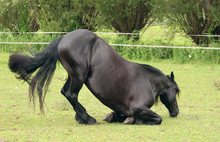According to Dr. Chris Day of the Alternative Medicine Center in Oxfordshire, England, more and more horse owners are turning to acupuncture when conventional drugs and traditional treatments do not successfully treat various horse ailments.
Day has been a licensed veterinarian since 1972 and acts as a holistic vet, acupuncture vet, herb vet and homeopathic vet in his clinic which is centrally located in England and draws animal owners from throughout the country to his services.
According to Day, many chronic diseases of horses and ponies do not respond to conventional drugs at all or are just held in check by drugs, with an ongoing risk of side effects. The use of steroids in treating horses is particularly risky because steroid-induced laminitis is very serious and can be incurable.
Some cases respond well to acupuncture delivered by a holistic vet with the ability to integrate acupuncture with a natural feeding diet, with chiropractic manipulation and with internal medicine, such as homeopathy or herbs.
Acupuncture is used in equine veterinary practice for a multitude of conditions and problems. Here are some of the most common of those in which Dr. Day has witnessed successful outcomes in his practice:
- Back Pain
- Arthritis
- Lameness
- Spavin
- DJD
- OCD
- Neck Pain
- Headshaking
- Laminitis
- Navicular Syndrome
- Equine Recurrent Uveitis (ERU - Moonblindness - Recurrent Ophthalmia - Periodic Ophthalmia)
- Azoturia
- Paralysis
- Shivering - Shivers
- Wobbler Syndrome
- Suspensory ligament problems
Any acupuncture vet should be able to explain the possibilities and uses of acupuncture for a particular horse depending on current condition and past treatment.
When using acupuncture, certain points on the horse's body are stimulated by needling, by moxibustion (heat), by electric impulse, by pressure, by laser, by injection or by implant.
According to Dr. Day, horses appear to submit very readily to the acupuncture needling process and to enjoy the treatment. At his clinic, they do not sedate horses that are unwilling to cooperate with acupuncture procedures, preferring instead to find a means of stimulus that they do like. Sedation often masks responses and may alter responses enough that they are either missed or misinterpreted, quite apart from the drug side-effects of sedatives.

